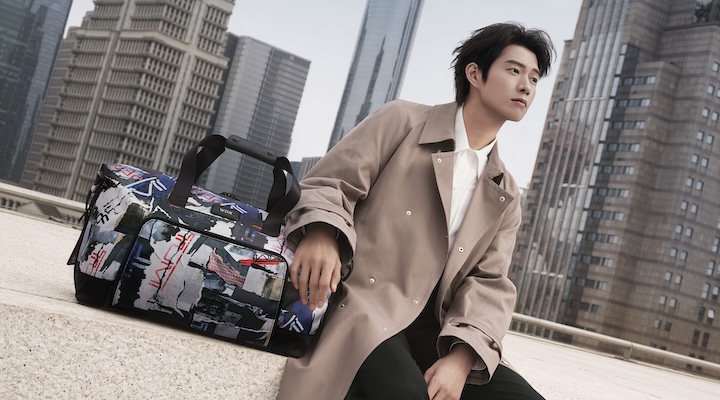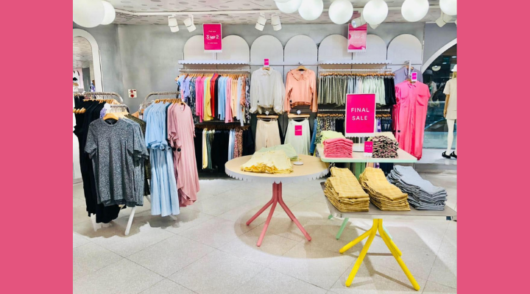Tumi is betting on the China market with the opening of its first flagship store on Shanghai’s Nanjing West Road, the city’s famous retail destination. Inside Retail spoke with Aris Maroulis, VP of Tumi Asia Pacific and Middle East, about the significance of the Shanghai flagship, the brand’s expansion plans and how the company is responding to the evolving needs of Chinese travellers. Inside Retail: Why does Tumi think now is the right time to open a flagship in the China market? Ho
et? How would you describe the Chinese consumer’s relationship with Tumi today?
Aris Maroulis: With China being one of our top-performing markets in Asia Pacific, it is an opportune time to capitalise on this excitement and further display our long-term commitment to the region. Our new Shanghai flagship store – our first flagship in China – is an important milestone where we present the full, premium Tumi retail experience at an iconic location.
Chinese consumers today have a highly sophisticated relationship with Tumi; they see us as more than just a luggage brand. They value our legacy of innovation, exceptional quality and purposeful design, recognising Tumi as a premium lifestyle brand that empowers their everyday journeys, whether for business or leisure.
We are seeing a continued appetite for elevated, experiential retail, especially in China, where consumers are extremely digitally fluent and highly brand-conscious. They expect more than just a product – they expect a brand to be part of their lifestyle. That has challenged us to constantly show up in more meaningful ways, from tailored storytelling and localised retail experiences to thoughtfully curated collections that reflect both Tumi’s DNA and regional sensibilities.
IR: Why did Tumi choose Shanghai as the latest flagship location? What are Tumi’s goals in China for the next 2-3 years in terms of store expansion, brand awareness and customer loyalty?
AM: In the next 2-3 years, we will focus on accelerating robust and sustainable growth in China by expanding and optimising our retail network, strengthening our brand positioning and strategic partnerships and continuing to deliver exceptional service to our valued customers.
Shanghai as a flagship location: As a global retail capital and a key cultural hub, Shanghai boasts significant advantages in premium retail, brand culture and innovative experiences. We chose to open our first flagship store in China in Shanghai precisely because of the city’s sophisticated and diverse consumer base, as well as its prominent leading role in fashion trends and artistic culture. This all makes it the ideal location to bring the full Tumi brand experience to life. The launch of our Shanghai flagship communicates Tumi’s long-term commitment, strong focus and continued investment in the Chinese market, which is a key part of our strategic vision for the Asia Pacific region.
Store expansion: Greater China is a key focus for us in terms of opening new store locations and refreshing existing ones. We have increased our retail presence and upgraded stores, both in key cities and prime travel retail destinations throughout Greater China. In 2024 and 2025 to date, we have elevated the customer in-store shopping experience through relocation and renovation for more than 30 locations. Moving forward, we also aim to broaden our retail footprint by entering emerging, high-potential cities beyond Tier 1 urban hubs. With more consumers in smaller cities seeking premium travel and lifestyle accessories, we hope to expand our reach and create localised retail experiences to cater to new demographics.
Brand awareness: We drive brand awareness by engaging customers through fresh and culturally relevant ways, such as our campaign work with actor Wei Daxun, our newly appointed Tumi Asia-Pacific brand ambassador. We also leverage a robust influencer and social media marketing program that ranges from product seeding to full-scale content collaborations and digital content innovation. By blending deeply localised storytelling with tailored experiences, we are resonating with Chinese consumers in ways that feel authentic and specific to the market. We work with KOLs, celebrities and platforms that are uniquely influential in China, and tap into social media with dedicated campaigns across WeChat, Rednote and Douyin that speak to local values, aspirations and aesthetics. Our real-time social content is rooted in local festivals and trending cultural moments to appeal to customers. We aim to be everywhere that they are to create more opportunities to connect even more closely.
Customer loyalty: We are investing in experiences that feel relevant and enduring to deepen our relationship with customers. Whether it’s our continued expansion in premium retail environments, elevated service offerings like customisation and repair, or how we engage through content and community, the goal is to create lasting relationships with our customers that go beyond the point of purchase.
IR: Given China’s emphasis on ‘new retail’ and tech-driven retail formats, how is Tumi responding or planning to innovate in this area?
AM: Tumi’s success has always come from listening and connecting deeply with our customers, understanding what they want from the brand in terms of product, retail experience and customer service. We feel strongly about providing customers with the full premium Tumi experience wherever they shop. Our focus will continue to be on creating new, larger stores in prominent locations and upgrading and expanding current key locations to reflect our premium lifestyle positioning.
When discussing ‘new retail’, we can look to our new Shanghai flagship as it redefines the traditional retail experience. More than just a retail space, the flagship is a physical embodiment of the Tumi brand where innovation, craftsmanship and purposeful design converge. Every element is thoughtfully curated to tell a story not only about travel and lifestyle, but also about progress, connection and cultural exchange. For example, its dedicated art installation area – which is unique to the Shanghai flagship – showcases seasonal installations in collaboration with local creatives to foster deeper cultural connection while fusing local culture with Tumi’s global aesthetic. A material wall also serves as a tactile exploration of our brand’s cutting-edge design materials.
As for tech-driven retail formats, we will strive for a seamless integration of physical and digital retail offerings to provide the holistic “phygital” experience that customers increasingly seek. We are expanding our presence on Tmall and JD.com, utilising livestreaming sessions to engage consumers with behind-the-scenes insights and product demonstrations and leveraging localised, interactive storytelling on influential social media like WeChat and Rednote. These touchpoints all play a role in how we deliver a consistent, world-class Tumi experience with personalised services and superior customer care across all channels.
IR: What role does travel play in the lives of Chinese consumers post-pandemic, and how does this affect product demand?
AM: Chinese consumers have redefined the way they travel – favouring expressive, experience-driven journeys that reflect their personal identity. This shift has fuelled demand for travel products that combine versatility, personalisation and style from brands that align with their lifestyle, values and ambitions. Today’s consumers want items that seamlessly transition between business and leisure, while remaining functional, mobile-friendly and photo-ready.
For the next generation of travellers, travel isn’t always about long-haul getaways. It’s about short escapes, weekend adventures and movement that feels personal and efficient. We are constantly rethinking how our brand shows up in those moments and anticipating how they move.
As we continue to see the strong rebound trend of outbound travel, we are focused on catering to this surging demand for travel and lifestyle products. Our extensive and expanding network of premium retail stores and travel retail locations is ready to seamlessly upgrade travellers’ lives on the move with exceptional and innovative pieces. Highly sought-after collections include 19 Degree Lite, which continues to redefine high-performance lightweight luggage and our flagship Alpha and Alpha Bravo lines that are constantly being upgraded and expanded. We’ve evolved our women’s collections led by our iconic Voyageur and introduced new lines this season, Agent and Olas. We’ve also expanded our lifestyle collections, which include accessories, belts, sunglasses, fragrance and even outerwear.
IR: Are there any behavioural changes or trends you’re observing with frequent business travellers or luxury tourists from China?
AM: Understanding our customers in Apac and China is at the core of our regional strategy. We have a customer-centric approach to everything we do, and we stay attuned to the evolving needs of modern global travellers – how they live and travel – to ensure that we are evolving with them in terms of product, retail experience and customer service.
Chinese travellers are influencing global standards. Their expectations are high, their awareness of global trends is sharp, and their engagement with brands – especially through digital platforms – is incredibly active. That level of discernment continues to push us to innovate not only in product, but also in how we connect with them in culturally relevant, locally meaningful ways.
Further reading: Tumi doubles down on Asia with store expansions and premium retail upgrades.







